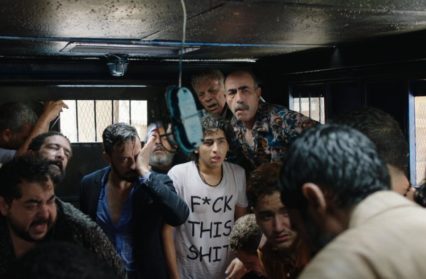After attending the Wales One World Film Festival, Geraint Rhys Whittaker reviews this year’s highlight of the festival, Mohamed Diab’s Clash.
It’s that time of the year again when the Wales One World (WOW) Film Festival brings the joys of international cinema to Cymru. Since 2001, the festival has brought eclectic cinema from all corners of the globe to Cardiff, Swansea, Aberystwyth, Mold and Cardigan, offering an alternative to the bigger budget movies. An established festival with question and answer sessions, workshops, and discussions with the film directors, it has cemented itself as an important contributor to cultural life in Wales.
This is the 5th year I have attended the festival, and each time, at least one film has a deeply profound impact on me, leaving me pondering its wider implications for days and weeks afterwards. This time around, the 2016 Egyptian film, Clash (Eshtebak in Arabic), provided that inspirational moment, and is exactly what makes the festival such a pleasure to attend.
The question ‘Where do I belong?’ is one that is forever negotiated. It changes context depending on who people are with and where people are at a particular moment in time. Clash takes this premise to explore the complex negotiations of religious, social and political diversity during the aftermath of the ousting of Mohammed Morsi in Egypt 2013. Set entirely in the back of a police riot van, the film observes the interactions between a number of detainees during the protests. The detainees are a cross section of Egyptian society, women and men, young and old, rich and poor. However, the defining characteristic which provides the tension for the film, is the division amongst those who support the recently ousted Muslim Brotherhood, and those who support the army and the state.
As the van moves through the chaotic streets and different stages of the riot, the characters come into conflict with each other over their political and religious differences. The MB supporters quickly organise themselves to sit on a different side of the van to the non-MB supporters, and regardless of the impracticalities of this, the politics of the truck begins to reflect the divisions in the wider society, with often violent and aggressive outcomes. People attack each other, voices are constantly raised and an air of distrust of the ‘other’ lingers throughout the film.
However, as the characters spend longer together, and the protests outside intensify, some of the barriers within the truck begin to break down, as we see that although political and religious divisions exist, there is much homogeneity which bind the characters. These are depicted through beautiful moments such as when the whole van reminisces over the music used to bring down the regime of Hosni Mubarak, the dictator which ruled the country for 30 years. Or when two men from different sides of the religious spectrum unite over their support for the same football team, or when the whole truck turns their backs, to give a young Muslim teenager in a jilbab privacy to go to the toilet. These moments of solidarity throughout the film are used to remind the characters and the audience that above all else, they are Egyptians, bound both fantastically and fatalistically by place and history.
The benefit of using the claustrophobia of the prison truck amplifies the intensity of these intimate moments of compassion that bind the characters together, but is also used as a catalyst to emphasise that the tension is never dissipated, and tempers can erupt at any second. It is a perfect tool to change between two quickly.
This is the movie’s beauty: it manages to avoid clearly picking a side, and actually disregards any notion of who is right or wrong in order to use the confines of the truck to remind us that although we are all human with the same basic bodily and emotional needs, peace is fragile and is a process that needs to be consciously worked and re-worked.
Like the Rwandan genocide, where people who had been neighbours for years quickly turned on each other because of their ethnic origins, or today with the increasing numbers of abuse towards black and Asian Brits experienced since Brexit, Clash is a stark reminder that we as humanity, regardless of culture, faith, nationality, age or class, are never too far away from letting these characteristics divide us in the most brutal of ways. We are forever stained by the pitfalls of difference.
The film never shies away from this, however, although it lays bare the complexities of negotiating religious and ethnic diversity, it does highlight that common narratives across difference, no matter how intense and uncomfortable can provide moments of beauty and solidarity. It is therefore a reminder that one characteristic of our identity, say faith or political identification, shouldn’t outweigh our relationships with the many parts which make up who we are. Although this is never easy, it is those small moments which can be built upon and can allow relationships to develop over sometimes seemingly grave differences.
Dr. Geraint Rhys Whittaker is a musician, writer and lecturer at Swansea University.












